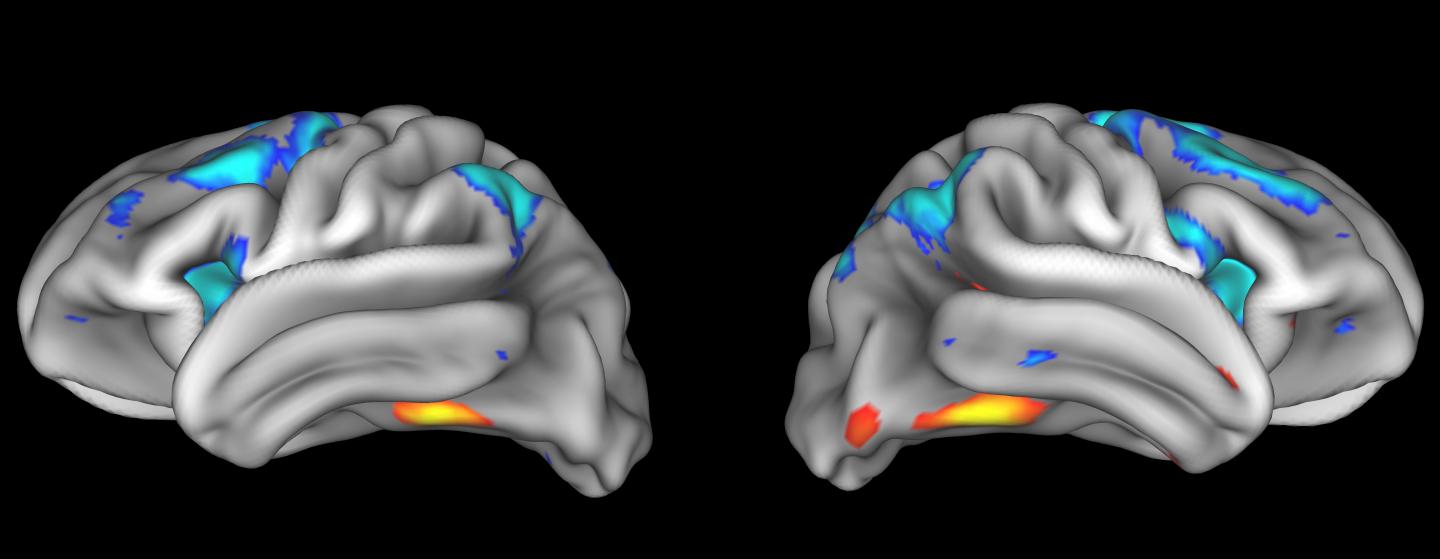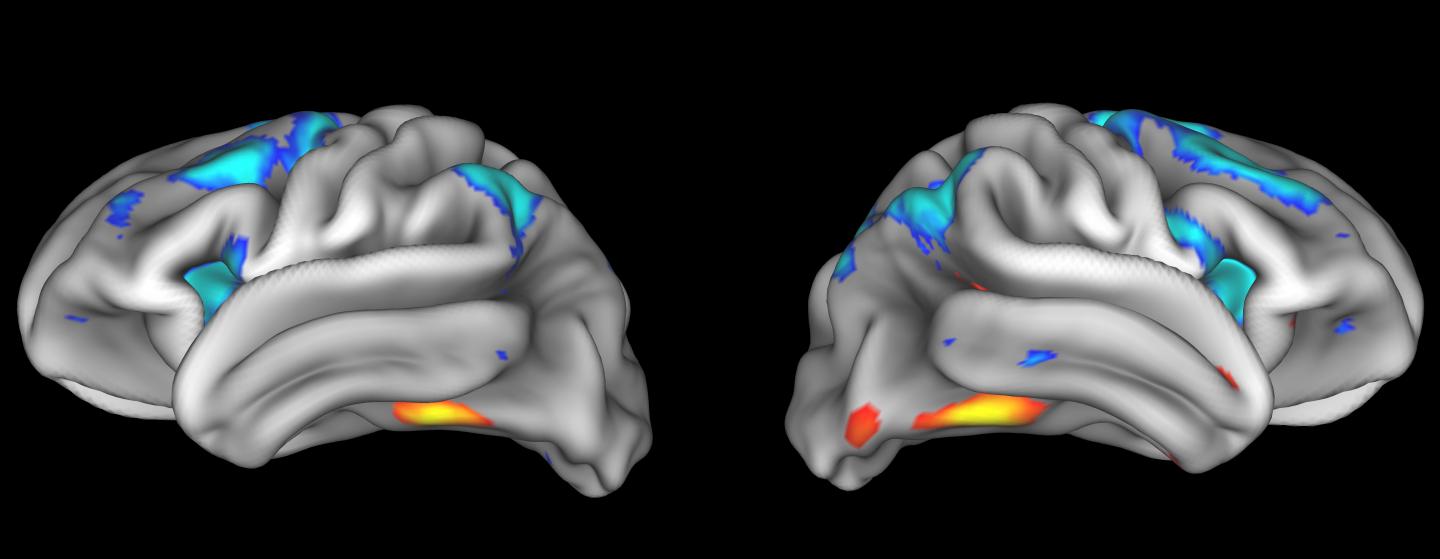
Credit: Source: Dr. Richard Watts and ABCD/Univ. of VT P.I. Dr. Hugh Garavan
The National Institutes of Health today released to the scientific community an unparalleled dataset from the Adolescent Brain Cognitive Development (ABCD) study. To date, more than 7,500 youth and their families have been recruited for the study, well over half the participant goal. Approximately 30 terabytes of data (about three times the size of the Library of Congress collection), obtained from the first 4,500 participants, will be available to scientists worldwide to conduct research on the many factors that influence brain, cognitive, social, and emotional development. The ABCD study is the largest long-term study of brain development and child health in the United States.
This interim release provides high-quality baseline data on a large sample of 9-10-year-old children, including basic participant demographics, assessments of physical and mental health, substance use, culture and environment, neurocognition, tabulated structural and functional neuroimaging data, and minimally processed brain images, as well as biological data such as pubertal hormone analyses. The data will be made available through the National Institute of Mental Health (NIMH) Data Archive, which can be accessed by researchers who obtain a free NIMH Data Archive account. All personally identifiable information is removed from the data to ensure participant confidentiality and anonymity.
"By sharing this interim baseline dataset with researchers now, the ABCD study is enabling scientists to begin analyzing and publishing novel research on the developing adolescent brain," said Nora D. Volkow, M.D., director of the National Institute on Drug Abuse (NIDA). "As expected, drug use is minimal among this young cohort, which is critical because it will allow us to compare brain images before and after substance use begins within individuals who start using, providing needed insight into how experimentation with drugs, alcohol and nicotine affect developing brains."
"Sharing ABCD data and other related datasets with the research community, in an infrastructure that allows easy query, data access, and cloud computation, will help us understand many aspects of health and human development." said Joshua A. Gordon, M.D., Ph.D., director of NIMH. "These datasets provide extraordinary opportunities for computational neuroscientists to address problems with direct public health relevance."
This comprehensive dataset, which will be disaggregated by sex, racial/ethnic group, and socioeconomic status, will allow researchers to address numerous questions related to adolescent brain development to help inform future prevention and treatment efforts, public health strategies and policy decisions, including, but not limited to:
- How do sports injuries impact developmental outcomes?
- What is the relationship between screen time and brain and social development?
- How does the occasional versus regular use of substances (e.g., alcohol, nicotine, marijuana) affect learning and the developing brain?
- What are some of the factors that contribute to achievement gaps?
- How do sleep, nutrition, and physical activity affect learning, brain development and other health outcomes across racial/ethnic and socioeconomic groups?
- What brain pathways are associated with the onset and progression of mental health disorders and do these pathways differ by sex?
- What is the relationship between substance use and mental illness?
- How do genetic and environmental factors contribute to brain development?
"The collection and release of this baseline data is a crucial step in ongoing efforts to sharpen our understanding of the link between adolescent alcohol use and long-term harmful effects on brain development and function," said George F. Koob, Ph.D., director of the National Institute on Alcohol Abuse and Alcoholism (NIAAA).
Recruitment of participants began in September 2016 through outreach to public, charter, and private schools, as well as twin registries in Colorado, Minnesota, Missouri and Virginia. The ABCD Study is designed to include a diverse population that reflects the demographics of the U.S., however these interim data may not fully capture that diversity as enrollment is not yet complete. So far, 7,637 youth have been enrolled, including 6,399 single participants and 1,238 twins/multiples, reaching a 66 percent recruitment milestone. The study aims to enroll a total of 11,500 children by the end of 2018. The next annual data release will include the full participant cohort.
###
Participants will be followed for 10 years, during which data are collected on a semi-annual and annual basis through interviews and behavioral testing. Neuroimaging data, including high resolution MRI, are collected every two years to measure changes in brain structure and function.
The ABCD Coordinating Center and Data Analysis and Informatics Center are housed at the University of California, San Diego and recruitment is being conducted at 21 study sites across the country. For more information, please visit the ABCD website at http://www.ABCDStudy.org.
The ABCD study is supported by the National Institute on Drug Abuse, the National Institute on Alcohol Abuse and Alcoholism, the National Cancer Institute, the Eunice Kennedy Shriver National Institute of Child Health and Human Development, the National Institute of Mental Health, the National Institute on Minority Health and Health Disparities, the National Institute of Neurological Disorders and Stroke, the NIH Office of Behavioral and Social Sciences Research, the NIH Office of Research on Women's Health, and the Division of School Health at the Centers for Disease Control and Prevention (CDC), with additional partnerships with the National Institute of Justice, the CDC Division of Violence Prevention, the National Science Foundation, and the National Endowment for the Arts.
For more information about the adolescent brain, go to: https://www.drugabuse.gov/related-topics/adolescent-brain.
About the National Institute on Drug Abuse (NIDA): The National Institute on Drug Abuse (NIDA) is a component of the National Institutes of Health, U.S. Department of Health and Human Services. NIDA supports most of the world's research on the health aspects of drug use and addiction. The Institute carries out a large variety of programs to inform policy, improve practice, and advance addiction science. Fact sheets on the health effects of drugs and information on NIDA research and other activities can be found at http://www.drugabuse.gov, which is now compatible with your smartphone, iPad or tablet. To order publications in English or Spanish, call NIDA's DrugPubs research dissemination center at 1-877-NIDA-NIH or 240-645-0228 (TDD) or email requests to [email protected] Online ordering is available at drugpubs.drugabuse.gov. NIDA's media guide can be found at http://www.drugabuse.gov/publications/media-guide/dear-journalist, and its easy-to-read website can be found at http://www.easyread.drugabuse.gov. You can follow NIDA on Twitter and Facebook.
About the National Institute of Mental Health (NIMH): The mission of the NIMH is to transform the understanding and treatment of mental illnesses through basic and clinical research, paving the way for prevention, recovery and cure. For more information, visit the NIMH website About the National Institute on Alcohol Abuse and Alcoholism (NIAAA): The National Institute on Alcohol Abuse and Alcoholism (NIAAA), part of the National Institutes of Health, is the primary U.S. agency for conducting and supporting research on the causes, consequences, diagnosis, prevention, and treatment of alcohol use disorder. NIAAA also disseminates research findings to general, professional, and academic audiences. Additional alcohol research information and publications are available at: https://www.niaaa.nih.gov.
About the National Institutes of Health (NIH): NIH, the nation's medical research agency, includes 27 Institutes and Centers and is a component of the U.S. Department of Health and Human Services. NIH is the primary federal agency conducting and supporting basic, clinical, and translational medical research, and is investigating the causes, treatments, and cures for both common and rare diseases. For more information about NIH and its programs, visit http://www.nih.gov.
NIH…Turning Discovery Into Health®
Media Contact
NIDAMEDIA
[email protected]
301-443-6245
http://www.nida.nih.gov
Original Source
https://www.drugabuse.gov/news-events/news-releases/2018/02/nih-releases-first-dataset-unprecedented-study-adolescent-brain-development





